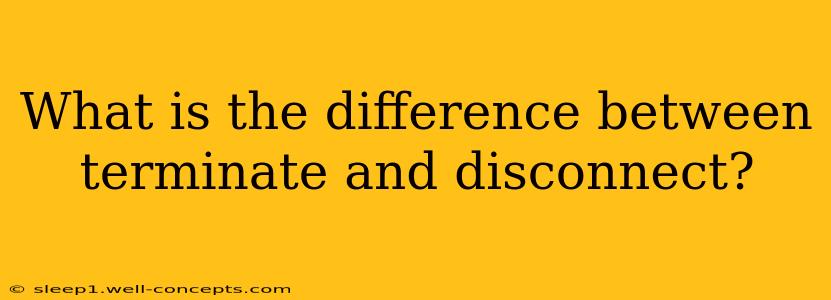The terms "terminate" and "disconnect" are often used interchangeably, especially in casual conversation. However, in technical contexts and formal settings, there's a subtle yet important distinction between the two. This article delves into the nuanced differences between terminating and disconnecting, exploring their applications in various fields.
What Does "Terminate" Mean?
To terminate something means to bring it to an end completely and definitively. It implies a final and irreversible action, often involving the cessation of all activity associated with the subject. This finality is the crucial element that differentiates it from "disconnect."
Think of it like this: terminating a contract means the agreement is officially over; all obligations cease, and there's no further contractual relationship. Similarly, terminating a process on a computer permanently stops its execution, freeing up system resources. The action is absolute and concludes the subject's existence in its current form.
Examples of Termination:
- Employment Termination: Ending an employee's job contract, often involving severance pay and final paperwork.
- Contract Termination: Formally ending a legally binding agreement between parties.
- Process Termination: Stopping a computer program or task completely.
- Service Termination: Completely ending a service, such as internet access or a subscription.
What Does "Disconnect" Mean?
To disconnect something means to break the connection or link between two or more things. While this often leads to a cessation of activity, it doesn't necessarily imply a permanent end. The crucial difference is the reversibility; a disconnected item can often be reconnected later.
Imagine disconnecting a device from a power source. The device stops working, but you can easily reconnect it and resume its operation. Similarly, disconnecting from a Wi-Fi network temporarily suspends your internet connection, but you can readily reconnect when you're back within range. The action is temporary and can be reversed.
Examples of Disconnection:
- Network Disconnection: Temporarily losing your internet or network connection.
- Device Disconnection: Unplugging a device from a power source or removing it from a network.
- Phone Disconnection: Ending a phone call.
The Key Difference Summarized:
The core difference boils down to reversibility. Termination is typically final and irreversible, while disconnection is often temporary and easily reversible. Consider the following table for a clearer comparison:
| Feature | Terminate | Disconnect |
|---|---|---|
| Finality | Permanent, irreversible | Temporary, often reversible |
| Action | Brings something to a complete end | Breaks a connection or link |
| Reversibility | Cannot be easily undone | Can often be easily reversed |
Conclusion: Choosing the Right Term
Understanding the subtle yet significant differences between "terminate" and "disconnect" is crucial for clear and precise communication. Choosing the appropriate term depends entirely on the context and whether the action implies a final end or merely a temporary interruption. Using the wrong term can lead to misunderstandings and misinterpretations, so careful consideration is always recommended.

